The 1940s saw a growth of African nationalism that positioned itself to challenge the rising Afrikaner nationalism. The ANC which was weak in the 1920 and 1930s was consolidated under the leadership of Alfred Xuma into a mass based party pursuing a more radical campaigning agenda. The emergence of the ANC Youth league in 1944 which demanded freedom from white domination and political independence laid down the foundation for the ANC’s campaigns in the 1950s. At the same time, rapid migration into urban areas precipitated the formation of new political and cultural associations. In Cape Town, the war rhetoric politicised some sections of the coloured community in Cape Town, the war was fought on premise of freedom, democracy. This was highlighted when the government announced the formation the Cape Coloured Permanent Commission (a body that would advise the government on coloured issues) in January 1943; the coloured community was divided as suspicion on the government’s intention abounded. Members of NEUF and other organisations formed the Anti-Coloured Affairs Department (Anti- CAD) movement in February 1943.
Civic politics in Langa and other townships forged a closer relationship with political organisations such as the NLL, NEUF, ANC and CPSA even before and during the war years. For instance, between 1939 and 1942 the Langa branch of the NLL became the leading organisation in resistance of the establishment of municipal beer halls. The NLL participated in the elections and won six of the nine seats on the advisory board. The Langa Vigilance Association (LVA) also became more militant under the guidance of the CPSA.
In 1943, the LVA was expanded with the creation of the Western Province Joint Vigilance Association movement. It was this kind of organisation that laid the foundation for the Anti pass Campaign mounted in the Western Cape between 1944 and 1945. In 1945, the government passed the Urban Areas Act which was aimed at further tightening existing restrictions on black people migrating into the cities. As a result pass law prosecutions increased leading to African mobilisation against pass laws. In 1944 people in Langa began mobilising to launch a protest against pass laws with leading members of CPSA and the ANC leading the initiative. The following year on October 1945 Mrs Winnie Siqwana member of the CPSA and ANC addressed a crown of 5000 protesters in Langa. Siqwana was the first African woman in Cape Town to join the CPSA in 1930 and was also a founder member of the Langa Women Vigilance Association. Siqwana campaigned vigorously against passes in Langa and led numerous deputations to the Cape Town City Council to protest on issues affecting the Langa community. Together with Annie Silinga, Siwqana also set up the first crèche in Langa township.
The mid 1940s were also a period of food shortages in Cape Town particularly for poor communities largely as a result of the World War II. Food shortages galvanised women to demand adequate food supplies from the government. Local women began forming committees at points where vehicles sent by the Department of Social Welfare distributed basic food stuffs. Silinga and Siqwana worked with other coloured women who were members of the CPSA in Cape Town such as Gladys Smith, Dora Tomana, Hettie September and Blanche La Guma. Women formed the Cape Town Women’s Food Committee (WFC) representing 30 000 women in the Cape Peninsula. By 1945, passive resistance had gained ground and become part of Cape Town’s socio-political landscape. The motto for the WFC was “Today we fight for food, tomorrow for the vote and for freedom for all.” In February 1945 women marched to the parliament to demand food rationing and a ministry of food.
As the rising tide of anti pass protests gathered pace, in August 1946 passes were burnt in a bonfire in Langa. Civic politics in Cape Town’s African areas of settlement became intertwined with national struggles and political movements. Food shortages in the Cape in the mid 40s galvanised women to fight for basic foodstuffs while they were fighting against passes. Despite the efforts by Africans to organise themselves politically, none of the opposition they offered was strong enough to overturn the system of racial segregation in the 1940s. In May 1948 the National Party (NP) led by DF Malan in alliance with the Afrikaner Party led by HC Havenga won the elections. After the elections the two parties became a single party. The ascendency of the NP saw a vigorous implementation of racial segregation through the passing of various racially discriminatory laws in the 1950s. Africans, Coloureds and Indians were affected by implementation of apartheid. While the laws segregated society on the one hand, they galvanised different racial groups to cooperate and oppose apartheid on the other hand.
The 1950s witnessed several protests against the apartheid government in Cape Town from the townships to the city centre. These were directed at the imposition of passes on women, forced removals and the increasing racial discrimination in general. In 1952 the government passed the Abolition of Passes and Co-ordination of Documents Act. While the name of the Act gives an impression that it abolished passes, it instead introduced reference books (passes) for all Africans over the age of 16. In addition an amendment was introduced the Native Urban Areas Act in 1952 which reduced the period of seeking employment from two weeks to three days. In 1954 women were issued with permits for the first time in the city. Reference books replaced and consolidated all previous documents carried by Africans whether they were permits, passes or contracts in August 1955.
On 26 June 1952 the ANC launched its Defiance Campaign against the apartheid government’s racially discriminatory laws at the Grand Parade in Cape Town. The government launched an attack on protesters focusing on African townships. In Cape Town, people responded by burning the Native Affairs Department offices and two churches in Langa. Women such as Dora Tamana and Annie Silinga were key people in the defiance campaign in Cape Town organising and leading protests against passes in Langa, Elsies River and Kensington. As a result Silinga was harassed by the police, endorsed out of Cape Town and deported to the Transkei.
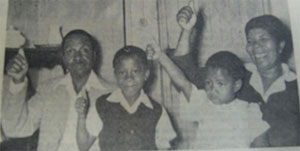 Annie Silinga (right) with her husband and children. Source: New Age, 31 May 1956
Annie Silinga (right) with her husband and children. Source: New Age, 31 May 1956
In 1953 Tamana declared that passes limited opportunities for women and they resulted in unemployment, lack of accommodation and they broke up families. Women took their fight against passes to the streets of Cape Town as hundreds of women marched in protest of the permit regulations.
The launch of the Defiance Campaign in 1952 also coincided with tercentenary celebrations of Jan van Riebeeck arrival in the Cape. Both the NEUM and the ANC inspired the several organisations in Cape Town to boycott the event. For instance the Langa Rugby Club, part of the Malay Choir and the Wetton Rate Payers Association were among those that participated in the boycott. An estimated 6000 people gathered at the Parade on 30 March to listen to Unity Movement speakers and on 6 April 1952 the ANC launched its Defiance Campaign at the same place.
The introduction of the Native Laws Amendment Bill to parliament also sparked protests by a number of groups in Cape Town. Thousands of people marched through the streets of Cape Town demanding Freedom of Worship and Freedom of Association in protest against Bill. Reverend T.J Savage who addressed the protesters declared: “We must protest. If necessary we must disregard the law”¦” (As quoted in the New Age, 30 May 1957, p.1). The ANC also called a conference at Woodstock Town Hall on May 26 to galvanize more protests against the bill. On Tuesday 25 June a meeting was held at the Grand Parade where leaders from the five congresses addressed people on the women’s anti pass campaign and 1 pound a day campaign. The 1 pound a day campaign was waged by the Congress of Trade Unions demanding 1 pound a day as minimum wage and an all round increase in wages. Meetings were held simultaneously in other areas such as Langa, Nyanga, Athlone, Elsies River and Kensington.
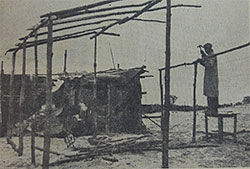 Man builds his shack in Nyanga after forced removals. Source: New Age, 29 March 1956
Man builds his shack in Nyanga after forced removals. Source: New Age, 29 March 1956
Furthermore, the government commenced implementing forced removals in some areas of Cape Town in the 1950s thus providing more impetus to protests. For example, Africans in Houtbay were ordered to move out by Mr Pannsegrouw of the Native Administration Department in the Cape Div council. Also Africans residing in Cook’s Bush which was just off Ottery Road were ordered to move to Nyanga. When plans to forcibly remove Africans living in Elsies River to Nyanga gathered pace, a protest meeting was called by the ANC branch in Elsies River and held at Marabastad hall. The meeting resolved to send a deputation to the Divisional Council to inform them of people’s objections of being moved to Nyanga. In addition they called on the government to stop the demolition of pandokkkies in Elsies River, and police raids designed to force people to move into Nyanga. As people refused the government resorted to prosecuting those who refused to move. For instance, in July 1957 10 Africans found guilty of refusing to move from Elsies River to Nyanga location. They were given suspended sentences and fines. Despite these protests the government continued to forcibly remove people to Nyanga from areas such as Kraaifontein and Elsies River.
In January 1956 Coloured people launched a demonstration on Parliament Street with members of the Cape Congress of Coloured Youth at the opening of parliament. Workers demonstrated against the Industrial Conciliation Bill outside parliament. SACTU led the protests. This was followed by a meeting at Salt River Hall from 1 March to March 4. The bill was condemned as an attempt by the government to split the labour movement. Furthermore, the South African Coloured People’s Organization (SACPO) launched a bus boycott in April 1956 in Cape Town.
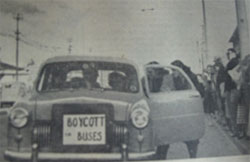 Driver assists passenger during the Cape Town bus Boycott. Source: New Age, 3 May 1956
Driver assists passenger during the Cape Town bus Boycott. Source: New Age, 3 May 1956
People picketed at terminuses in places such as Mowbray, Claremont and Wynberg and bus routes encouraging others not to ride buses. The bus boycott campaign was orgnised and coordinated by SACPO, ANC, Congress of Democrats (COD) and South African Congress of Trade Unions (SACTU) was joined by the Labour Party and the Liberal Party.
Following the campaign members of the Special Branch swooped on the COD offices and confiscated Freedom Chatter literature in May 1956 at Sea Point. In a show of solidarity to the 1956 Treason Trialists, Cape Town hosted film shows to raise money for the Treason Trail Fund. Several meetings were held in Cape Town to show support for the detained leaders. For instance, the “We stand by our leaders Committee” held a meetings in Elsies River and Athlone and Kaya Mandi in Stellenbosch where a collection was made to show support.
Another significant development occurred in February 1956, the Separate Representation of Coloured Voters Bill was passed as an Act. Coloureds were removed from the common voters roll in the Cape and placed on a separate voters roll. Subsequently, the Cape was divided into four electoral divisions and the Coloureds received the right to elect one White representative for each of these constituencies to represent them in the House of Assembly. Previous efforts to effect this change by National Party government had failed as the coloured people’s right to vote was entrenched in the constitution of the Union. The NP required two thirds majority of a joint sitting of both houses for the change to happen. An attempt was made to use the simple majority to remove coloureds from the voters roll but this was challenged in court and ruled unconstitutional by the Appellate Division. In November 1955 the NP enlarged the senate from 48 to 89 enabling it to obtain to obtain the majority it needed to remove Coloureds from the voters roll. This drove political organizations such as the SACPO to forge an alliance with other organizations such as the COD, ANC, SACTU and South African Indian Congress (SAIC).
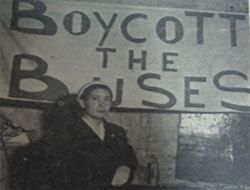 Daphne MacLachlan (19 years old) who worked as domestic worker in Greepoint joined the bus boycott and walked from her home in Kensington to town. She declared "Bus apartheid is most unfair. I do not see any reason why non Europeans should be subjected to the indignity of being ordered where to sit on the bus...I am prepared to boycott buses as long there is apartheid." Source: New Age, 3 May 1956
Daphne MacLachlan (19 years old) who worked as domestic worker in Greepoint joined the bus boycott and walked from her home in Kensington to town. She declared "Bus apartheid is most unfair. I do not see any reason why non Europeans should be subjected to the indignity of being ordered where to sit on the bus...I am prepared to boycott buses as long there is apartheid." Source: New Age, 3 May 1956
Rent increases also provided fuel for the anti apartheid protest in Cape Town. Africans in Langa township rose up against the rent increase proposals from the City council. The Langa Advisory Board convened a meeting on July 3 1957 at Langa Hall where the city council proposals for rent increases were rejected. A deputation was sent to Mr Rogers who was the location superintendent to register the displeasure of the residents. Subsequent to this, protest agnist rent increases spread to areas such as Nyanga with the ANC calling the meeting. People such as Oscar Mpetha, Mabece, Ngo, Vatsha were instrumental in organizing people to reject rent increases.
In addition, police raids aimed to forcing people to move and detaining those who were considered as ‘illegal’ also raised tensions. For instance when the police began raiding the new Nyanga ‘transit’ camp where people that had been forcibly removed were relocated, women in Nyanga rose in protest and converged at the superintendent’s office in October 1957. That same year in Nyanga, Africans led by ANC and Johnson Ngwevela secretary of the African Western Grand True Temple refused to have beer halls constructed at Nyanga.
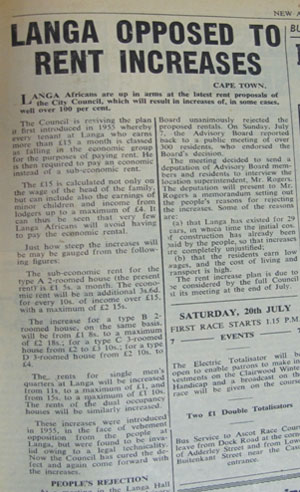 New Age, 18 July 1957
New Age, 18 July 1957
On 9 August 1957 women marked the 1956 march in Cape Town by demonstrating and convening at Grand Parade. Amongst organizations that took part were the ANC women’s League, Black Sash, Federation of South African Women, National Council of Women and the Anglican Church Mothers Union. Elsewhere 200 that same month workers of Spekham food products went on strike at Stikland Cape Town demanding better wages and conditions. In December a protest attended by an estimated 2000 people gathered at the Grand Parade and was addressed by Philipa Mureell an organizer of the National Union of Distributive workers (NUDW).
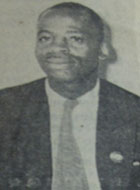 Oscar Mpetha. Source: New Age
Oscar Mpetha. Source: New Age
Lastly, the opposition to Bantu Education also became a focal point of passive resistance in the Western Cape. In June 1952 the Teachers League of South Africa (TLSA) held a conference in Cape Town which was attended by 1 200 teachers from all over the Cape Province. The conference resolved to reject separate Bantu, Coloured and Indian education and to build unity among all teachers. Teachers opposed to Bantu Education were dismissed by the government and the Cape African Teachers Association (CATA) challenged the dismissals. For instance, two teachers A Mangcu and LL Sihlali were dismissed for opposing Bantu Education. CATA took the matter to court on their behalf and the Supreme Court nullified their expulsion and ordered the Native Affairs Department to reinstate them.
The government responded by enacting Legislation that clamped down on the Defiance Campaign. In June 1950 the government passed the Suppression of Communism Act which banned the CPSA (renamed the South African Communist Party (SACP) in 1953) and its activities. In November 1952 regulations to control meetings with penalties of 300 pounds or three years imprisonment were passed by the government. In 1953 the Criminal Law Amendment Act criminalised protesting or supporting any protests and acts passive resistance against any law. The Public Safety Act which enabled the government to declare a State of emergency which meant suspension of legal rights. It was made illegal for African workers to strike. Throughout the 1950s the government squeezed out the political space for anti apartheid activities driving activists underground.